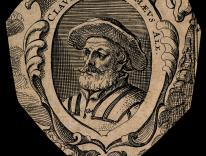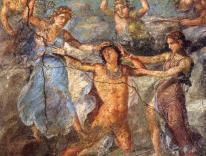It’s Christmas Eve, 1940, in a Nazi prisoner-of-war camp on the heights above Trier, Germany. The camp sits on the border of occupied Luxembourg, four hours from Paris. Outside, a war rages. The Nazis have taken much of Europe, and France is torn between resistance and collaboration. Inside the camp, in front of an audience of fifteen thousand rapt POWs, atheist philosopher Jean-Paul Sartre and a flock of priests perform an original Nativity play, Bariona, or the Son of Thunder (Bariona, ou le fils du tonnerre). After the curtain, everyone onstage hurries to midnight Mass.
Sartre had been a prisoner in Stalag XII D since August 1940. At the time of his incarceration, he was thirty-five years old. While his most famous work, Being and Nothingness, wouldn’t be published until 1943, his best-known novel, Nausea, and his collection of short stories, The Wall, had already put him on the scene as one of Europe’s preeminent intellectuals. But in prison, Sartre wrote his first play, set in Bethlehem on the night of Christ’s birth.
While imprisoned, Sartre found intellectual companionship in several priests who attended his lectures on Rilke and Heidegger, which included an explication of Being and Time. He often refereed theological arguments between priests and sometimes jumped into the fray himself, once refuting Pope Pius IX on the Immaculate Conception. Sartre later said that it was the priests’ influence that brought him to write a play about the Nativity: “It was simply a matter, agreed on with my fellow prisoner priests, of finding a subject most likely to appeal to both Christians and unbelievers that Christmas Eve.”
But there is more to it than that. The Nativity wasn’t just a convenient, audience-friendly subject; Sartre saw in the story of Christ’s birth the tensions and questions that his own philosophy raises. And in their particular circumstances—a POW camp in the belly of the Second World War—existentialist concerns abounded: death was everywhere, and the choice to either submit to fascist rule or resist was an everyday concern. As a result, the play offered a Christian existentialism that could speak to his incarcerated audience.
Throughout his career, Sartre gave much thought to the effect a performance can have on its audience. In his 1964 autobiography, The Words, Sartre recounts how a collective experience of cinema united a disparate crowd, their common humanity transcending the social differences that divided them. The next place he experienced such a collective phenomenon—“that naked awareness without recoil of each individual towards all the others”—was not until 1940, in Stalag XII D.
The prison-camp production awakened Sartre to what he later identified as theater’s essential role. As he put it in a 1946 lecture, the playwright “must fuse all the disparate elements in the auditorium into a single unity by awakening in the recesses of their spirits the things which all men of a given epoch and community care about.” Sartre intended Bariona to unite the crowd of prisoners and inspire hope in the face of Nazi tyranny. To get it past the censors, he packaged it inside a story about the birth of God.
The plot of the play is simple, though the cast is large—over sixty parts—with Sartre himself playing the role of Balthazar, one of the three Magi, who stands in as Sartre’s philosophical representative. It begins with a Roman official named Lelius, an administrator of the same census that drove Mary and Joseph to Bethlehem. He is capitalistic and imperialistic, woefully and intentionally out of touch with the average Roman subject. He travels to the small town of Bethaur to collect the census rolls and bring news of a new tax. The charismatic village chief, Bariona, is outraged and declares a moratorium on births to deny the Roman empire subjects to conscript. Lelius, and the empire he represents, is a thinly veiled send-up of the occupying Nazis (though, as Sartre remembered, the Nazis in the audience missed this connection).
Meanwhile, in the hills above Bethaur, shepherds guard their flock and discuss Bariona’s plan. Suddenly, an angel greets them, shivering from his departure from a heaven “become completely empty like a great big hole,” who bids them share the news of the savior’s birth. They rush to town to tell the news, which delights the townspeople but angers a skeptical Bariona. With the arrival of the three wise men, the townspeople depart to Bethlehem. Bariona stays behind, and the village witch doctor reveals to him that Jesus will one day be crucified. Upon learning that “the mob will adopt [Christ’s] teachings” rather than rise up against Rome, Bariona plans to travel to Jerusalem and murder Christ before his teachings can spread. On the way, an angel urges him to “think about that look on Joseph’s face” and not kill the baby Jesus. Bariona decides to spare the infant and is later convinced by Balthazar to accept Christ. In the aftermath, Bariona decides to launch a suicide attack on Romans, and his sacrifice allows the Holy Family time to escape before the Massacre of the Innocents.
The play incorporates an important tenet of Sartre’s philosophy: man is thrust into reality without choice, but defines his own existence through his ability to choose. As Sartre writes in Being and Nothingness, “he materializes in the world, encounters himself, and only afterward defines himself.” And in choosing our own reality, we are implicitly judging what we think all persons should be.
As Bariona describes himself, he is “free, and not even God himself has any power over a free man.” He, “who never asked to be born,” chooses not to follow his wife and his villagers to Bethlehem to worship Christ and takes full autonomy over that choice. He is a Sartrean hero, aware of the responsibilities of his own existence—as Sartre later understood it, “condemned to be free…because once cast into the world, he is responsible for everything he does.”
After Bariona decides not to kill Christ, he hides and watches his kin worship the baby, despite knowing that, in his view, they are worshiping a doomed hope. He laments to God that “you have made me a night creature and cut into my flesh a terrible secret: It will never come morning.” In the end, it is Bariona’s power to choose that saves him. Balthazar, as Sartre’s mouthpiece, urges Bariona to take hold of his expendability and “fling” himself “toward the sky.” Bariona does this by “joyfully” choosing to cast himself upon the Romans in a final, triumphant defense of the Christ-child.
Earlier in the play, when the angel appears to the shepherds, Sartre describes the encounter in existential terms. Caiphus, a shepherd, says:
Some kind of life that isn’t mine has chilled me to the marrow of my bones. I don’t know what it is. I’m lost at the bottom of another life like at the bottom of a well…all around me enormous pillars of some sort of tenderness I just don’t understand are rising right up to the sky, and I feel smaller than a little worm.
The angel also describes the heavenly landscape in the wake of the Incarnation. We get to see, as Sartre renders it, the very moment of Christ’s entrance into history. It begins with the angel expressing how “there’s a great void and a great expectancy in heaven…and there’s this cold in my body like the cold in heaven.” And then, at the moment of Incarnation: “He’s born! His infinite and sacred spirit is imprisoned in the soiled body of a child and is astonished to be suffering and ignorant.” At the end of the exchange, there is no glorious exit for the angel. Sartre describes him leaving “on his own two feet, limping a little, in a very natural way.”
Sartre, it is clear from later writings, believed the world was becoming disenchanted with the idea of God year after year. As he put it in Existentialism Is a Humanism: “Existentialism is not so much an atheism…rather it affirms that even if God were to exist it would make no difference.” Sartre claims that hope exists with or without God, because human reality is “a doctrine of action.” But Bariona offers a glimpse of a different world: a human mother and father meet the immensity of God in a manger; a sad old man shares the good news in the dark.
Sartre’s atheism did not waver even as he engaged the religious subjects of Bariona. Twenty years later, when he finally consented to have his first play published, he insisted on including a note at the beginning which read, in part, “The fact that I took my subject from Christian mythology does not mean that the drift of my thinking changed, even for a moment, during my captivity.” However, by the time of his death in 1980, his thinking had changed, at least somewhat. Sartre admitted that Jewish eschatology—in which a new world will emerge from the old, in which the dead will be reborn—was appealing to him. As he put it, “It’s the beginning of the existence of men who live for each other.”
Around the same time, Sartre admitted to Simone de Beauvoir that “there are elements of the idea of God that remain in us and that cause us to see the world with some divine aspects.” And even with his atheism still firmly in place, he couldn’t help but recognize himself as created: “I don’t see myself as so much dust that has appeared in the world, but as a being that was expected, prefigured, called forth…. [T]his idea of a creating hand that created me refers me back to God.”
In 1940, when Bariona was performed, Sartre’s Nazi captors had taken up their existence to demand that others should die. Instead, Sartre exhorted his audience to seize their existence to affirm their lives and the lives of others. In Sartre’s telling, God became man using the same choice we all have. The wonder of the Incarnation is God choosing to exist.
Please email comments to [email protected] and join the conversation on our Facebook page.
Share
Previous Story
Still Too Slow
Next Story
Portrait of the Scholar as a Young Governess


